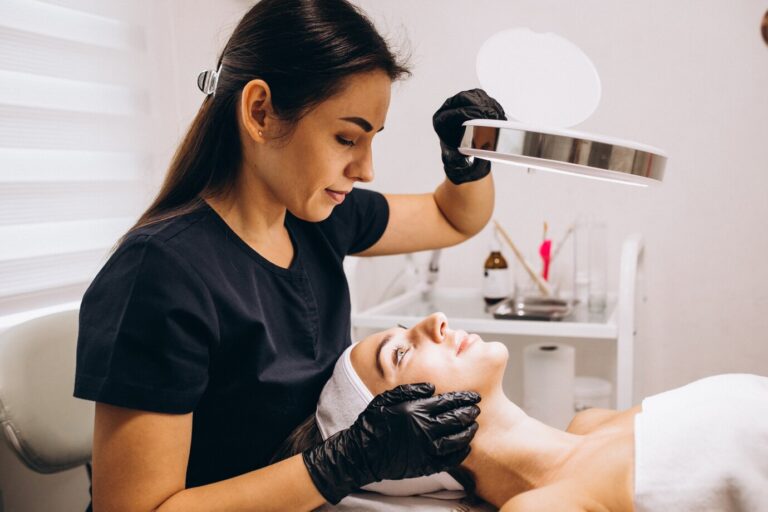Improved skin health and enhanced facial aesthetics often begin with cosmetic dermatology treatments. This specialized area of dermatology focuses on non-surgical procedures that target concerns such as fine lines, acne scars, pigmentation, and skin texture. Cosmetic dermatology offers clients the opportunity to refine their appearance while addressing specific skin concerns, using personalized approaches for effective results.
What Is Cosmetic Dermatology?
Cosmetic dermatology involves treatments designed to improve the appearance of the skin, hair, and nails. These procedures primarily address aesthetic concerns. Common procedures include injectable fillers, Botox, laser resurfacing, chemical peels, and microneedling. Administered by trained professionals, these treatments aim to enhance facial features, improve skin texture, and address common concerns such as wrinkles, pigmentation, and scars. This type of dermatology has become a sought-after field due to its minimally invasive options and advancements in technology, which provide natural-looking results with reduced recovery times. This field offers diverse treatments tailored to individual needs.
Which Cosmetic Dermatology Treatments Are the Most Popular?
Individuals seeking to rejuvenate their appearance often consider non-surgical treatments to achieve their goals. Injectables like Botox and dermal fillers are widely utilized to smooth expression lines or add volume to areas such as the lips, cheeks, or under the eyes. Botox temporarily reduces muscle activity in areas such as the forehead or around the eyes diminishing the appearance of dynamic wrinkles. Fillers use hyaluronic acid-based solutions to restore volume and create symmetry. Laser treatments have become another popular option. Various lasers help resurface skin, improving texture, minimizing discoloration, and reducing visible signs of aging.
How Can a Dermatologist Help Me with Acne?
Acne-related conditions, including scars and pigmentation, often pose challenges for individuals. Cosmetic dermatology provides several targeted treatments to manage both active acne and residual effects. Chemical peels are a recognized treatment for mild to moderate acne and can also reduce the appearance of scars and pigmentation. These involve applying a solution to the skin that causes controlled exfoliation, encouraging cell turnover to reveal smoother, clearer skin.
Microneedling is another technique that can improve acne scarring. By creating controlled micro-injuries in the skin it stimulates the skin’s natural healing process and collagen production. Microneedling is often combined with serums or platelet-rich plasma (PRP) to enhance results further. For those dealing with post-inflammatory hyperpigmentation, dermatologists may recommend laser treatments. They also can recommend topical agents to diminish dark spots, improving skin tone uniformity.
How Can a Dermatologist Help Me with Wrinkles?
Fine lines and wrinkles may develop due to factors such as aging, repetitive facial expressions, or sun exposure. Wrinkle reduction often involves Botox injections. This interrupts the repetitive muscle movements that contribute to the formation of expression lines. These treatments deliver visible results within days and are effective for reducing crow’s feet, forehead lines, and frown lines.
Dermal fillers are frequently used to restore volume to areas that appear sallow or hollow due to aging. They can fill in deeper wrinkles or restore structure to the cheeks and jawline. Laser treatments also contribute to wrinkle management. By resurfacing the skin, encouraging collagen production, and tightening lax areas, lasers help to improve skin elasticity. They also reduce the appearance of fine lines. The cumulative effect offers a smoother and more youthful appearance.
Taking the Next Steps with Cosmetic Dermatology
Exploring cosmetic dermatology is an opportunity to enhance your appearance through tailored treatments that address individual skin concerns. These procedures use advancements in dermatological science to provide subtle yet transformative results. Consulting a qualified dermatologist ensures that the most suitable treatments are chosen based on your needs, goals, and skin type. Professional expertise ensures safety and an approach that aligns with both aesthetic aspirations and long-term skin health. If you are ready to explore these options, schedule a consultation with a licensed cosmetic dermatologist today to develop a personalized plan that suits your preferences and aligns with your skincare goals.

